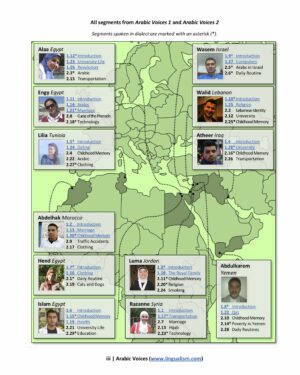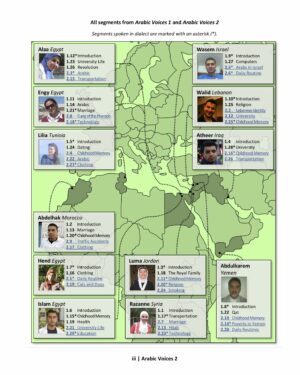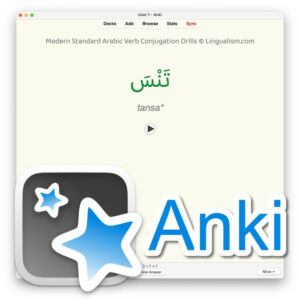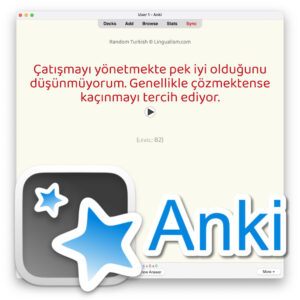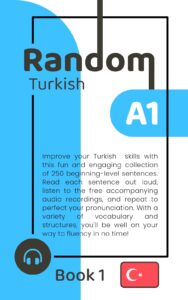☀️SUMMER SALE! 😎SAVE 10% for a limited time. Use coupon code LING10 at checkout. Sale ends July 31. (Offer excludes sale items, bundles, and store credit.)
Home » Modern Standard Arabic » Smoking–Luma
Smoking–Luma
| Peace, mercy and blessings of God, [00:00.2] | السلام عليكم ورحمة الله وبركاته، | |
| Hello and welcome to another Arabic Voices video on your way to learning Arabic. [00:02.8] | أهلًا ومرحبًا بكم في فيديو آخر من فيديوهات Arabic Voices طريقك لتعلم العربية. | |
| Today we will talk about what Luma said about smoking and the harms of smoking. [00:10.2] | اليوم سنتحدّث عمّا قالته لومة بشأن التدخين وأضرار التدخين. | |
| And we start on page 137, where Luma says on line 3: (Not to mention the health of the smoker, which is negatively affected by the number of cigarettes he consumes and burns per day). [00:15.9] | ونبدأ في الصفحة المائة سبع وثلاثون، حيث تقول لومة في السطر الثالث: (ناهيك عن صحة المدخن التي تتأثر تأثرًا سلبيًا بعدد السجائر التي يستهلكها ويحرقها في اليوم). | |
| Blame says here [not to mention], and this phrase means [along with] or [in addition to], especially if you mention it afterwards that perhaps it is sometimes more harmful or more important. [00:35.1] | وتقول لومة هنا [ناهيك عن]، وهذه العبارة تعني [إلى جانب] أو [بالإضافة إلى]، خاصةً إذا ما كنت تذكره بعد ذلك ربما يكون هو أكثر ضررًا أو أكثر أهمية أحيانًا. | |
| For example, you can say: (The country suffers from many political problems... political, not to mention economic problems). [00:52.8] | فيمكنك مثلًا أن تقول: (إن الدولة تعاني من مشاكل سيا سيا… سياسية كثيرة ناهيك عن المشاكل الاقتصادية)، | |
| That is, there are also besides this… economic problems, and perhaps economic problems are also more harmful; [Not to mention] means [beside] or [in addition to]. [01:03.3] | أي أن هناك كذلك إلى جانب هذا ال… المشاكل الاقتصادية، وربما تكون المشاكل الاقتصادية هي كذلك أكثر ضررًا؛ [فناهيك عن] تعني [بجانب] أو [بالإضافة إلى]. | |
| Then on line 5, Luma says, "There are heavy smokers, and they are spread all over the country." And Luma here uses the word [hate] with [smoking]. [01:20.4] | بعد ذلك في السطر الخامس—تقول لومة: (يوجد المدخنين بشراهة، وهم منتشرين في جميع أنحاء البلاد)، وتستخدم لومة هنا كلمة [بشراهة] مع [التدخين]. | |
| And in the Arabic language, as well as in many languages, sometimes we always use one word with another, and yko… These two words are concurrent, we often use them repeatedly together, for example to be [adjective with a descriptor] or [verb with a source], and so on. [01:36.9] | وفي اللغة العربية، وكذلك في كثير من اللغات، أحيانًا ما نستخدم كلمةً ما دائمًا مع كلمة أخرى، ويكو… وتكون هاتين الكلمتين متلازمتين، غالبًا ما نستخدمهما بتكرار معًا، كمثلًا أن تكون [صفة مع موصوف] أو [فعل مع مصدر] وهكذا. | |
| In the Arabic language, we often use the word [to smoke heavily], and the meaning of smoking a lot is to smoke a lot, so they smoke a lot or smoke heavily with one meaning, but we often use the word [gluttony] with [smoking]. [02:01.6] | وفي اللغة العربية نستخدم كثيرًا كلمة [التدخين بشراهة]، ومعنى التدخين بشراهة أي التدخين كثيرًا، فيدخنون كثيرًا أو يدخنون بشراهة بمعنّا واحد، ولكن كثيرًا مانستخدم كلمة [شراهة] مع [التدخين]. | |
| We also sometimes use it with food. You can say: (He eats greedily," meaning he eats a lot, which means he is engrossed, and is careful about food (he eats greedily); or (heavy smoke," we often use the word [binge] with [smoking] to mean smoking a lot. [02:19.6] | كذلك أحيانًا ما نستخدمها مع الطعام، يمكنك أن تقول: (هو يأكل بشراهة) أي يأكل كثيرًا ويعني بانهماك، وبحرص على الطعام (يأكل بشراهة)؛ أو (يدخن بشراهة)، كثيرًا ما نستخدم كلمة [شراهة] مع [التدخين] لنعني التدخين كثيرًا. | |
| On line 8, Luma says: (But no one respects this saying or the confirmed scientific fact," Lummah here uses the word [or], to correct what she said or to check and explain or say precisely what she wants to say. [02:40.5] | في السطر الثامن—تقول لومة: (ولكن لا أحد يحترم هذه المقولة أو الحقيقة العلمية المؤكدة)، وتستخدم لومة هنا كلمة [أو]، لتصحيح ما قالته أو للتدقيق وشرح أو القول بدقة ما تريد أن تقوله. | |
| And [or] here you can use [pl] instead, you can say: (But no one respects this saying but the proven scientific fact, or the proven scientific fact) Both are true. [03:04.2] | و[أو] هنا يمكنك أن تستخدم [بل] بدلًا منها، يمكنك أن تقول: (ولكن لا أحد يحترم هذه المقولة بل الحقيقة العلمية المؤكدة، أو الحقيقة العلمية المؤكدة) كلاهما صحيح. | |
| When I use [or] or [pl] sometimes they have the same meaning, we use them to correct or to say something more precisely, you can say: “This is true” or “It is more correct.” [03:20.0] | عند استخدامي [أو] أو [بل] أحيانًا يكونان بمعنّا واحد، نستخدمهما للتصحيح أو لقول شيء بأكثر دقة، يمكنك أن تقول: (هذا الأمر هو صحيح) أو (هو الأصح). | |
| You can say: (This is true, rather it is the most correct) meaning you correct what you say, or be more accurate in what you say, because no one confirms this statement or the confirmed scientific fact, or rather the confirmed scientific fact. [03:36.8] | يمكنك أن تقول: (هذا هو صحيح بل هو الأصح) أي أنت تصحح ما تقوله، أو تكون أكثر دقة فيما تقوله، فلا أحد يؤكد هذه المقولة أو الحقيقة العلمية المؤكدة أو بل الحقيقة العلمية المؤكدة. | |
| Then we move on to line 11, where Luma says: (Very recently smoking was prohibited in public facilities," and the word [recently] means [recently]. [03:57.3] | بعد ذلك ننتقل إلى السطر الحادي عشر، حيث تقول لومة: (مؤخرًا جدًا تم منع التدخين في المرافق العامة)، وكلمة [مؤخرًا] تعني [منذ وقتٍ قريب]. | |
| You can say: "Smoking was recently banned" or "Smoking was banned recently." [04:10.7] | ويمكنك أن تقول: (مؤخرًا تم منع التدخين) أو (منذ وقتٍ قريب تم منع التدخين). | |
| We then move on to line 15, where Luma says: (In fact, smoking in the old days was only for the elderly). [04:23.2] | ننتقل بعد ذلك إلى السطر الخامس عشر، حيث تقول لومة: (في الحقيقة التدخين بالزمن القديم، كان يقتصر فقط على الكبار من السن). | |
| Here we would like to quickly review a formula we have explained, which is the use of the past [was] with [present verb], and this indicates that something happened in the past and is no longer happening now; The matter has changed. Smoking is not limited to adults only now, but also young ones. [04:33.8] | وهنا نودّ مراجعة سريعًا على صيغة كنا قد شرحناها، وهي استخدام الماضي [كان] مع [الفعل المضارع]، وهذا يدل على أن أمرًا ما، كان يحدث في الماضي ولم يعد يحدث الآن؛ فالأمر قد تغير فالتدخين لا يقتصر على الكبار من الناس فقط الآن ولكن كذلك الصغار منهم. | |
| (In fact, smoking in the old time was limited," in the form of [was] with [present verb], meaning that the matter has changed now. [04:56.3] | (في الحقيقة التدخين بالزمن القديم كان يقتصر)، بصيغة [كان] مع [الفعل المضارع] أي أن الأمر قد تغير الآن. | |
| Likewise, she says (limited only to the elderly) and uses the verb [restricted], and with the verb [limited] you use [on], and this correct form is if you want to use the verb [restricted] in the sense of [to be specific], then you must use [on]. [05:07.1] | كذلك هي تقول (يقتصر فقط على كبار السن) وتستخدم الفعل [يقتصر]، ومع الفعل [يقتصر] تستخدم [على]، وهذه الصيغة الصحيحة إذا أردت أن تستخدم الفعل [يقتصر] بمعنى [يخص]، فلابدّ من استخدام [على]. | |
| It says: (This law is limited to the elderly) meaning that it pertains to the elderly, so it is necessary to use [on] with the verb [restricted], and this verb means [to pertain to]. [05:25.8] | تقول: (هذا القانون يقتصر على كبار السن) أي يخص كبار السن، فلابدّ من استخدام [على] مع الفعل [يقتصر]، وهذا الفعل يعني [يختص بـ]. | |
| on line 16, Luma says: (And you wouldn't find a taxi driver, for example, who smoked while he was at work). [05:39.6] | في السطر السادس عشر تقول لومة: (وما كنت تجد سائق تاكسي مثلًا يدخن وهو في مجال عمله). | |
| We move to line 29, where Loma says: (The government began very recently to ban the sale of shisha in cafes). [05:49.7] | ننتقل إلى السطر التاسع والعشرون حيث تقول لومة: (بدأت الحكومة مؤخرًا جدًا بمنع بيع الشيشة في المقاهي). | |
| Here the verb [began] is used, and when we use the verb [bad]a, we often use the preposition بـ with it. [06:01.1] | وهنا تستخدم لومة الفعل [بدأ]، وعند استخدام الفعل [بد]أ غالبًا ما نستخدم معه حرف [ الباء]. | |
| She says (I started doing something, I started doing my homework, I started studying, I started going out," and so on, she starts doing something. [06:10.2] | تقول (بدأت بفعل أمر، بدأت بأداء الواجب بدأت بالمذاكرة، بدأت بالخروج)، وهكذا، فتبدأ بعمل أمرٍ ما. | |
| Then we move to line 37, where Luma says: (I wish all people smoke like me," and here she speaks more generally. [06:23.4] | بعد ذلك ننتقل إلى السطر السابع والثلاثون، حيث تقول لومة: (فيا ريت كل الناس بتدخن زيي)، وهي هنا تتحدّث أكثر بشكل عام. | |
| And if… In fact يا رَيت (I wish) is a colloquial word, if you want to say the same thing in al-Fusha, then it is more correct to say [Via I wish]. [06:36.2] | وإذا… في الحقيقة [يا رَيت] هي كلمة عامية، إذا أردت أن تقول نفس الشيء في الفصحى، فالأصح أن تقول [فيا ليت]. | |
| [If only] it is wishful thinking and is used to wish that something were not the way it is. [06:46.5] | [يا ليت] هي للتمني وتستخدم لأن تتمنى أن يكون أمرٍ ما على غير ما هو عليه. | |
| She says: (I wish... I wish all people smoked like me," meaning that you wish that people would not smoke heavily, but smoke as you smoke; [I wish] you use [I wish] to wish for something. [06:54.6] | تقول: (ياريت… يا ليت كل الناس تدخن مثلي) أي أنك تتمنى أن يكون الناس لا يدخنون بشراهة، ولكن يدخنون مثل ما تدخن؛ [فيا ليت] للتمني، تستخدم [يا ليت] لتمني أمرٍ ما. | |
| I hope you have benefited from this video. [07:16.1] | أتمنى أن تكونوا قد استفدتم من هذا الفيديو. | |
| Thank you very much, and see you again in another video. [07:18.6] | أشكركم شكرًا جزيلًا، وألقاكم على خير في فيديو آخر. | |
| Peace, mercy and blessings of God. [07:22.9] | السلام عليكم ورحمة الله وبركاته. |
Video Lessons
Arabic Voices MSA Lessons
Arabic teacher Mostafa Ahmed takes us through segments in MSA from Lingualism's book Arabic Voices 1: Authentic Listening and Reading Practice in Modern Standard Arabic and Colloquial Dialects, explaining interesting points of grammar and vocabulary.
© 2024 Lingualism LLC


